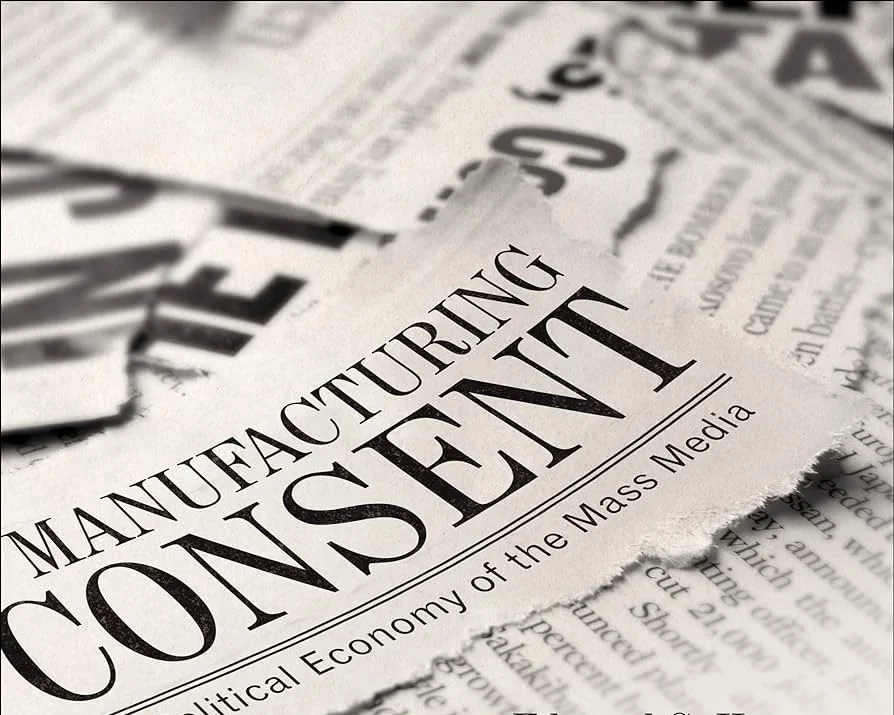Media manipulation is ubiquitous in our daily lives, shaping our perceptions, opinions, and even actions. In his seminal work, Manufacturing Consent, Noam Chomsky offers a profound analysis of how media functions not as a neutral conveyor of facts, but as a tool serving specific social interest groups. Through the “propaganda model,” Chomsky sheds light on the ways media creates consensus by selecting, emphasizing, and omitting information to align with the agendas of powerful elites. This analysis remains highly relevant today, as media influence permeates every aspect of modern life, from political discourse to consumer behavior.

The “propaganda model” identifies five filters through which news is shaped: ownership of the media, reliance on advertising revenue, sourcing of information from powerful institutions, backlash against dissenting views (flak), and overarching ideological narratives such as anti-communism. These filters ensure that media narratives consistently align with the interests of dominant groups, subtly influencing public opinion while maintaining existing power structures. For instance, media organizations, driven by profit and influenced by their owners’ political or economic agendas, prioritize stories that resonate with advertisers or uphold elite interests. Simultaneously, dissenting voices are marginalized or ignored altogether.
This phenomenon is evident in the selective coverage of news events. Certain stories are sensationalized to draw attention, while others are downplayed or omitted altogether. For example, media may focus on trivial celebrity scandals while ignoring systemic social issues or global crises. Such selective reporting not only shapes public awareness but also frames societal values and priorities. The language and tone used in reporting further reinforce these narratives, guiding public opinion toward specific conclusions.
In the digital age, the influence of media manipulation has expanded. Social media platforms, often touted as democratizing forces, have introduced new layers of complexity. Algorithms designed to maximize user engagement prioritize content that aligns with users’ existing beliefs, creating echo chambers that reinforce polarization. Additionally, targeted disinformation campaigns and the rise of “fake news” exacerbate the problem, making it increasingly difficult for the public to distinguish between fact and propaganda.
Chomsky’s insights highlight the necessity of approaching media with a critical eye. While the media has the power to shape societal consensus, individuals are not powerless against its influence. To counteract manipulation, people must actively cultivate media literacy and critical thinking skills. This means recognizing biases, questioning the sources and motivations behind information, and seeking out diverse perspectives. For instance, rather than relying solely on mainstream news outlets, individuals can explore alternative sources, compare international media coverage, and analyze issues from multiple angles.
Moreover, individuals must remain vigilant against the cognitive traps set by media narratives. This involves not only identifying what is being reported but also asking what is being omitted. Who benefits from a particular framing of events? What other perspectives exist? By maintaining this analytical approach, individuals can resist being passive consumers of information and instead engage as informed participants in shaping public discourse.
In an era dominated by information overload, Chomsky’s work serves as both a warning and a guide. Media manipulation may be omnipresent, but by fostering independent thought and diverse inquiry, individuals can reclaim their agency. Only by breaking free from the narratives imposed by the media can we navigate the complexities of modern society with clarity and critical judgment.
Reference:
Chomsky, N. (198Chomsky, N. and Herman, E.S., 1988. Manufacturing Consent: The Political Economy of the Mass Media. New York: Pantheon Books.




You’ve explained the theory in depth and made it easy to follow and understand. Audiences that don’t know the theory of manufacturing consent could keep up and gain knowledge of the theory from your blog as you have explained it very well. However, to help audiences understand the theory better you could have looked for a specific example to apply the theory to extend your demonstration of knowledge of the concepts within manufacturing consent.
You could have tried to find bad press on a celebrity that tries to change the audience’s opinion of them negatively. Such as the bad press Ariana Grande has had with her supposed cheating scandals and creating concern around the celebrity with her recent weight loss while being on the press tour of Wicked. Having a specific example would elevate your blog as it creates a bigger understanding of the theory you discuss.
Overall, you have explained the theory well and it is engaging, but a specific example would create an even better understanding of manufacturing consent.
I agree with the point that media manipulation is omnipresent and deeply influences how we think and act, often without our awareness. The idea that media not only conveys information but also creates consensus resonates strongly, as it highlights the subtle ways narratives are shaped to serve specific interests. This is evident in political reporting, where selective emphasis and framing can drastically sway public opinion. The suggestion to obtain information from multiple channels and maintain critical thinking is particularly vital. In an age of information overload, cultivating independent judgment is one of the few defenses against being unknowingly influenced by media agendas.